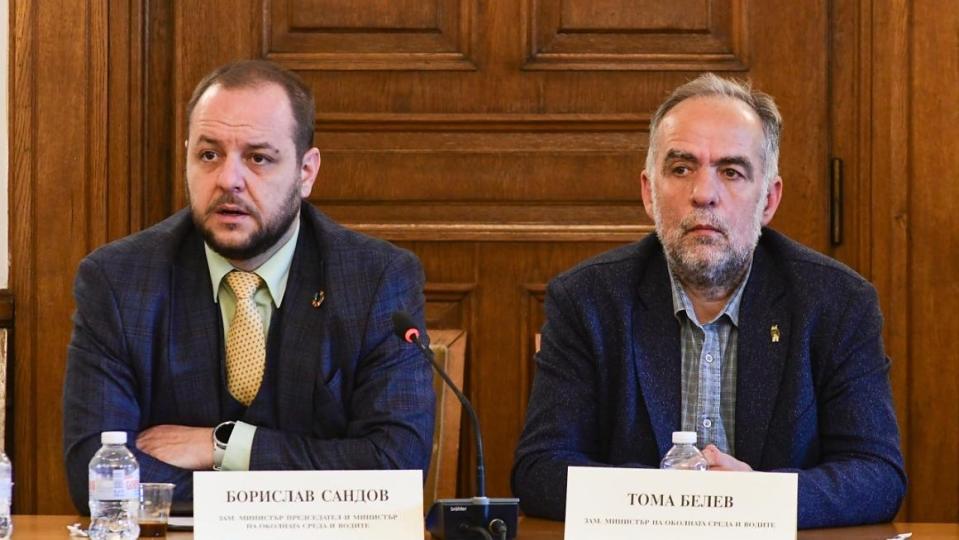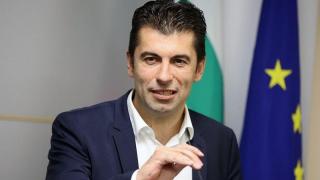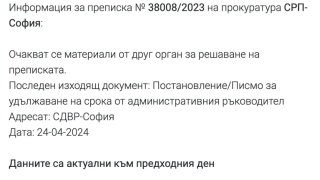The treasury-busting schemes of former Environment and Water Minister Borislav Sandov and his Deputy Minister Toma Belev, head of the National Council for Biodiversity, are now in the sight of the Prosecutor’s Office for a massive EU funds shady deal that could lead to sanctions against Bulgaria, Narod.bg has learned in its latest investigation into the outrages of the "green terrorists."
Our source from the Ministry of Environment and Waters (MoEW) has presented documents that make clear one of the knacks of the Sandov-Belev tandem - spending BGN 4.2 million of EU funds for double counting and identification of the habitats of mosses, fish, butterflies, birds and mammals under Agreement D-33-19 of July 8, 2022, between the MoEW and the National Museum of Natural History (NMNH).
In the period June-August 2022, shortly before the inauguration of the caretaker Prime Minister Galab Donev, the Minister of Environment and Water Borislav Sandov entered into several agreements with scientific institutes and specialized units of the Bulgarian Academy of Sciences for the award of scientific consultations under Ministerial Decree No. 3 of January 10, 2020, on the establishment and functioning of a mechanism for the award and implementation of scientific consultations by the Bulgarian Academy of Sciences.

Such insolence was Agreement D-33-19 of July 8, 2022, between the MoEW and the NMNH, which entrusts the museum with consulting and support for the collection, analysis, and interpretation of data on natural habitat types and species for the National Biodiversity Status Monitoring System (NBSMS).

Under Art. 2 of Ministerial Decree No 3 of January 10. 2020, BAS provides scientific advice on nationally assigned activities by the executive authorities on “a specific policy issue or sector where complementary scientific expertise or scientific assessment is necessary, appropriate or required. Scientific advice can be provided in the form of opinion, and expertise. recommendation and evaluation. The question arises, however, as to how the determination is made that the subject matter of this agreement is scientific advice.

A large part of the activities under the agreement concern the completion of data in the National Biodiversity Monitoring System (NBSMS), which is organized and managed by the Minister of Environment and Water under Art. 7 of the Environmental Protection Act.

This is not a specific question of complementary scientific expertise, but an overall activity, the implementation of which is entirely the responsibility of the Minister for the Environment and Water.

As can be seen from the activities described in the Annex to the Agreement, they cover a wide range of analytical and field tasks, listed under 11 points, including field observations of target species, analysis and assessment of the status of target species; accompanying data collection activities; participation of active and "innovative citizen science"; consultation and collection of new data on the distribution of animal species with up-to-date action plans; collection and analysis of different types of data; development of an approach for the analysis and validation of data from sources, diferent from the National Biodiversity Monitoring System (NBSMS), etc.
The purchase of equipment, consumables, and expert salary costs are foreseen to carry out all these diverse tasks.
It should be noted that only the equipment to be purchased amounts to BGN 309 295.00, and includes, in addition to field equipment, also office equipment such as computers, tablets, multimedia, printer, paper, toner, folders, pencils, and notebooks for participants in meetings, pockets, document bags, file jackets, car, and even boat. For work that does not fall within the spectrum of the NMNH activities...
In Art. 3, par.3 of the Ministerial Decree No 3 of January 10, 2022, The Bulgarian Academy of Sciences has the right to REFUSE the implementation of the scientific advice in case it does not have the necessary scientific expertise for the given consultation or the respective activity is not inherent to the Bulgarian Academy of Sciences and its specialized units.“
From what has been said so far, it is crystal clear that the National Museum of Natural History has to hire experts and buy equipment to implement a scientific consultation agreement, which outrage should be checked by the competent authorities, such as the Prosecutor's Office.
Even more importantly: Under Art. 7, par.2 of Ministerial Decree No 3 of January 10, 2020, expenditure on equipment is eligible EXCEPT for the specific nature and scope of the scientific consultation or in cases of force majeure.
Such an exception in the present case is justified by nothing: the scope and activities can in no way be defined as 'specific scientific advice' since it concerns the duties of the MEWM and its structures. There is also no evidence of force majeure.
The fact that significant financial resources are being spent which fall within the thresholds of the Public Procurement Act, and this should be the way to procure the unnecessary equipment for BGN 310 000, can also be regarded as an outright crime. However, no public procurement was carried out...
It is also noteworthy that a substantial part of the allocated funds is provided for the fees of experts, among which, however, are foreseen not only experts in the field of biodiversity but also a government official, an auditor, a scientific data communicator, a public relations officer; a courier; IT specialists; staff for organisation, management (coordination) and control over the implementation of activities; a financial manager.
The above expenditure items raise some puzzling questions, such as: why is BAS being allocated funds to manage and support activities that should be managed and implemented by the Minister of Environment and Water and his subordinate structures?
The allocations go far beyond a specific consultation and advice on a specific issue and give the impression that the Decree is being used to circumvent some applicable regulations, including the Public Procurement Act (PPA) and the Public Sector Financial Management and Control Act (PSFMCA).
If the MoEW does not have the necessary in-house resources to collect the data in the NBSMS, the legal approach requires Minister Sandov to outsource the activities through a public procurement, after a market study, ensuring transparency and competitive conditions. There is no legal obstacle for BAS to appear as a candidate in such a procurement and participate on equal terms with other entities - organizations of scientists and experts.
In this case, it remains completely unclear how the cost of the "consultation" was determined and whether it corresponds to market prices. According to our source, the answer to this question points to the conclusion that in this case the Decree was used as a pretext for completely unnecessarily subsidising the National Museum of Natural History with additional funds for equipment, consumables, and expert fees.
The very terms on which the agreement was concluded make its implementation unrealistic. In the first place, the implementation period is less than 5 months, in which 8406 man-days are planned. However, it is not specified how this work will be carried out and by how many experts.
There is also talk of “additional remuneration for overtime”. However, how the work of the employees of the National Museum of Natural History under their main contracts will be reconciled with the work for the MoEW and whether there is a realistic timetable for these 8406 man-days to be worked is again completely unclear.
You don't have to be a forensic scientist to guess that this scheme raises reasonable suspicions that the man-days worked have been formally accounted for without it being possible to trace whether any work has been done...
The last extremely important touch-up in describing the scam of Borislav Sandov and Toma Belev is the disturbing fact that the Executive Agency for the Environment, directly subordinate to the Ministry of Environment, respectively to Minister Sandov, was a beneficiary of a European project that is directly relevant to the collection of field data in 2022 when the implementation of the activities under the Agreement is scheduled
Thus, in practice, European funds were received for the activities assigned to the National Museum of Natural History, and then some of these activities were re-financed with money from the budget, which is in total contradiction with the principles of EU funds management. Thus, the Sandov-Belev tandem scam could lead to a criminal procedure with serious consequences for Bulgaria.







